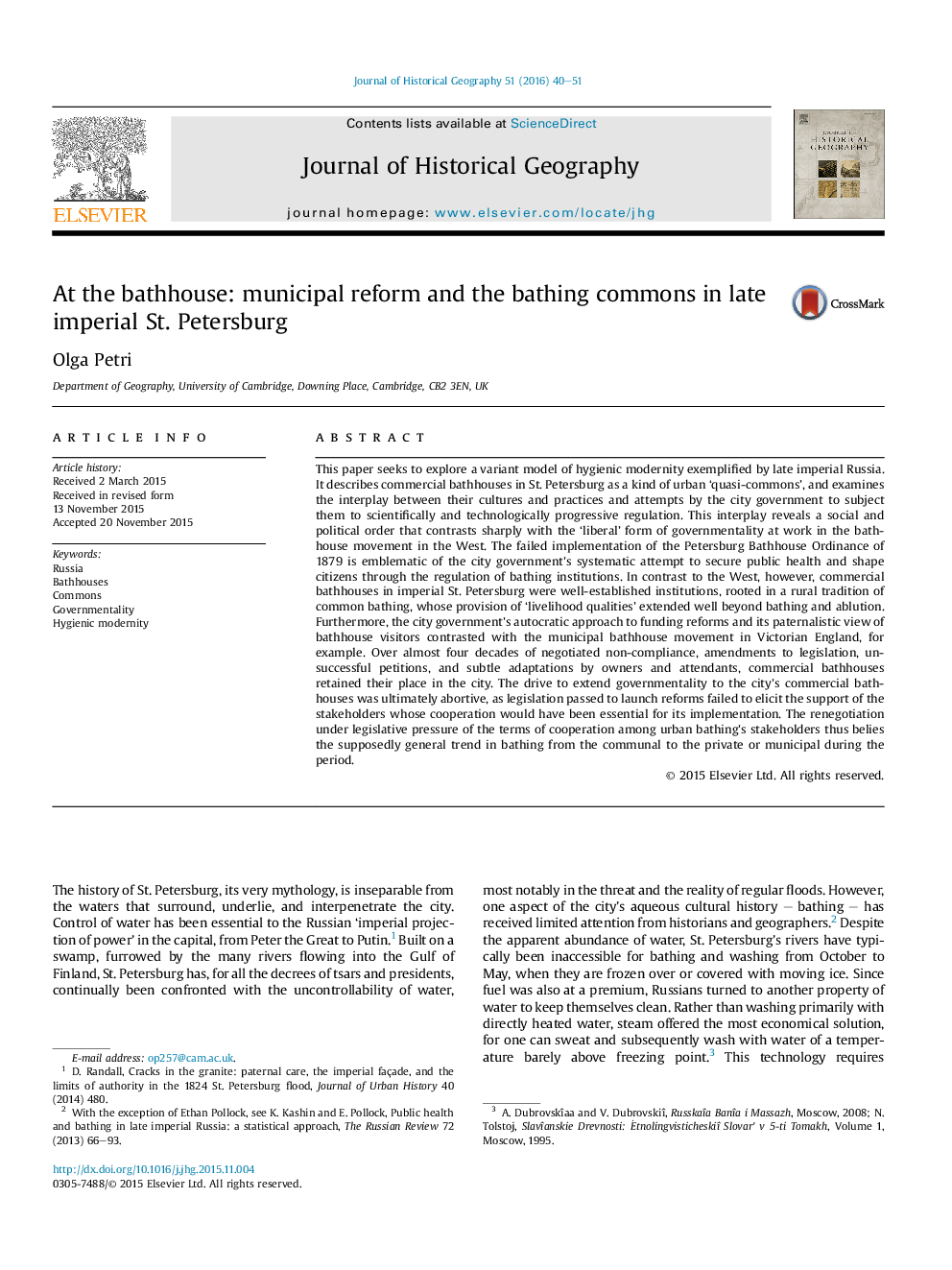| کد مقاله | کد نشریه | سال انتشار | مقاله انگلیسی | نسخه تمام متن |
|---|---|---|---|---|
| 7447440 | 1483974 | 2016 | 12 صفحه PDF | دانلود رایگان |
عنوان انگلیسی مقاله ISI
At the bathhouse: municipal reform and the bathing commons in late imperial St. Petersburg
ترجمه فارسی عنوان
در حمام: اصلاحات شهرداری و عمومی در سن پترزبورگ امپراتوری
دانلود مقاله + سفارش ترجمه
دانلود مقاله ISI انگلیسی
رایگان برای ایرانیان
کلمات کلیدی
روسیه، حمام ها، مشترک، حکومتداری، مدرنیته بهداشتی،
ترجمه چکیده
این مقاله به دنبال کشف یک مدل مدرن مدرن بهداشتی است که در سالهای اخیر شاهد امپراتوری روسیه است. این حمام تجاری در سنت پترزبورگ را بعنوان نوعی شبه معمولی شهری توصیف می کند و بررسی ارتباط بین فرهنگ ها و شیوه های آنها و تلاش های دولت شهر را برای تطبیق آن با مقررات مترقی علمی و تکنولوژیکی بررسی می کند. این تعامل، یک نظم اجتماعی و سیاسی را نشان می دهد که به شدت با شکل لیبرال حکومتداری در کار در جنبش حمام در غرب مواجه است. پیاده سازی ناکارآمدی حکم پانزدهم حوضه پانزدهم سال 1879 نشان از تلاش نظام مند شهرداری دولت برای حفاظت از سلامت عمومی و شکل دادن به شهروندان از طریق تنظیم موسسات حمام است. اما در مقابل غرب، حمام های تجاری در سنت پترزبورگ امپریالیستی، موسسات خوبی بودند که در یک سنت روستایی از حمام معمولی ریشه داشتند، که کیفیت خدمات معیشتی آن به مراتب بیشتر از حمام و وضو بود. علاوه بر این، رویکرد خودکامه دولت در مورد اصلاحات مالی و دیدگاه پدرانه ای از بازدید کنندگان حمام، به عنوان مثال، در مقایسه با جنبش حمام شهری در ویکتوریا انگلستان، متفاوت است. بیش از تقریبا چهار دهه عدم انطباق مذاکرات، اصلاحات قانونی، درخواست های ناموفق و سازگاری ظریف با صاحبان و همراهان، حمام های تجاری، محل خود را در شهر حفظ کرده اند. در نهایت رانندگی برای گسترش حکمرانی به حمام های تجاری شهر، در نهایت نابود شد، زیرا قوانین تصویب شده برای راه اندازی اصلاحات نتوانست حمایت از ذینفعانی که همکاری آنها برای اجرای آن ضروری بود، نادیده گرفته شود. در نتیجه مذاکرات مجدد تحت فشار قانونی شرایط مشارکت ذینفعان شهری شهری، به نظر می رسد که روند ظاهرا عمومی در حمام کردن از جمعی به خصوصی یا شهرداری در طول دوره است.
موضوعات مرتبط
علوم انسانی و اجتماعی
علوم انسانی و هنر
تاریخ
چکیده انگلیسی
This paper seeks to explore a variant model of hygienic modernity exemplified by late imperial Russia. It describes commercial bathhouses in St. Petersburg as a kind of urban 'quasi-commons', and examines the interplay between their cultures and practices and attempts by the city government to subject them to scientifically and technologically progressive regulation. This interplay reveals a social and political order that contrasts sharply with the 'liberal' form of governmentality at work in the bathhouse movement in the West. The failed implementation of the Petersburg Bathhouse Ordinance of 1879 is emblematic of the city government's systematic attempt to secure public health and shape citizens through the regulation of bathing institutions. In contrast to the West, however, commercial bathhouses in imperial St. Petersburg were well-established institutions, rooted in a rural tradition of common bathing, whose provision of 'livelihood qualities' extended well beyond bathing and ablution. Furthermore, the city government's autocratic approach to funding reforms and its paternalistic view of bathhouse visitors contrasted with the municipal bathhouse movement in Victorian England, for example. Over almost four decades of negotiated non-compliance, amendments to legislation, unsuccessful petitions, and subtle adaptations by owners and attendants, commercial bathhouses retained their place in the city. The drive to extend governmentality to the city's commercial bathhouses was ultimately abortive, as legislation passed to launch reforms failed to elicit the support of the stakeholders whose cooperation would have been essential for its implementation. The renegotiation under legislative pressure of the terms of cooperation among urban bathing's stakeholders thus belies the supposedly general trend in bathing from the communal to the private or municipal during the period.
ناشر
Database: Elsevier - ScienceDirect (ساینس دایرکت)
Journal: Journal of Historical Geography - Volume 51, January 2016, Pages 40-51
Journal: Journal of Historical Geography - Volume 51, January 2016, Pages 40-51
نویسندگان
Olga Petri,
